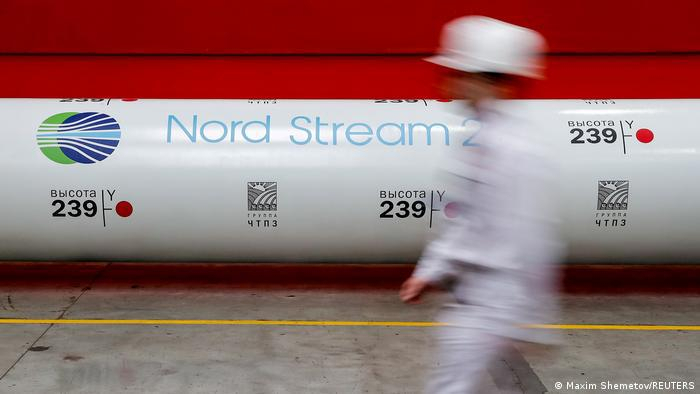
After years of debate in Europe, the Russian state-backed energy giant Gazprom confirmed last month that it had finished building Nord Stream 2, a 760-mile pipeline with the potential to send 55bn cubic metres of gas under the Baltic Sea to Germany every year.
Russia is already Europe's biggest gas supplier, but once running, Nord Stream 2 will add a significant boost to the annual 170 billion cubic metres that enter the bloc through Poland, Ukraine, and Czechia, and Slovakia pipelines.
Nord Stream 2 promises to improve the stability of gas supplies as Europe enters its worst energy crisis in recent history. However, as critics lambast the diversionary pipeline as having no commercial justification beyond shoring up Russia's foreign reserves, it may prove to be nothing more than another tool in Moscow's foreign policy agenda to influence European politics.
Notwithstanding the humanitarian disaster in the making as millions may go without power this winter, Europe is setting itself a near impossible target in the name of the climate emergency. There will be a growing need for foreign oil as the EU mandates the closing of coal mines and re-investment in renewables. Putin will without a doubt have Europe's difficult transition period in mind. The clock is ticking on fossil fuels, and Russia would be undermining its finances by speeding up Europe's decarbonisation.
"Russia has significant reserves of energy resources and a powerful fuel and energy complex, which is the basis for economic development, a tool for domestic and foreign policy," reads the opening line of the Energy Strategy 2020 paper. With astronomical revenues promised when the pipeline goes online, Moscow will be eager to fund its foreign exploits by securing contracts.
This will be easier for Russia to do than in the past. The expansion of the Russian sphere of influence into Europe has been bound by historical dependence on Ukraine to transit significant gas volumes to the continent. With Ukraine once serving as a strong deterrent against further escalation, Nord Stream 2 will allow a complete bypass of the country in oil transit, making the gas shield that once protected it from invasion irrelevant.
Thus, the completion of Nord Stream 2 should be an intolerable thought, as it serves nothing more than an injustice towards Ukraine's diplomatic partnership with the EU. The country has fully liberalised its gas market and implemented the Third Energy Package, unbinding gas transmission from production and trading. Allowing Nord Stream 2 to progress is an effective penalisation against Ukraine for advancing EU interests and respecting European values, and a reward for Russia for doing the opposite.
The same judgment of political isolation could be cast against the decision for Western governments to apply sanctions upon Belarus. The country's economy has been sundered by EU, UK, and US sanctions to damage the authoritarian regime of President Lukashenko. With the country cut off from EU energy and investments, Putin has stepped in to provide Minsk with $630 million in loans for the next fifteen months and deployed fighter jets and anti-aircraft missiles to its western border, buzzing NATO fleets.
On the question of post-soviet nations, Western leaders are seemingly encouraging hypocrisy though their policy stances on Russia, levying sanctions on fringe states destabilised by Russia's influence but not where it would really hurt— on Nord Stream 2 itself.
In its final days, the Trump administration had been planning to go as far as sanctioning German entities for their role in the project, former officials said. Those entities included Nord Stream's German CEO, Matthias Warnig, and the German vessel Krebs Geo. The US had also imposed sanctions on the Russian company KVT-RUS, which operates the Fortuna lay ship.
However, President Biden has waived sanctions on the pipeline, despite his stated opposition to the project, on the basis that it is near completion and the need to rebuild economic ties with key ally Germany. Strengthening bilateral relations clearly remains a priority under Biden's presidency. However, by hogtieing Belarus' economy to Russian gas and energy infrastructure, he is effectively forcing the country out of the Western orbit against the will of its people.
This example serves broader evidence of the West as two-faced, introducing sanctions only on defenceless nations or individuals to serve financial gains. Nations such as Ukraine and Belarus are easy pickings for a bully, the trifecta of UK, US, and EU blocs in this case. The actions of all three administrations demonstrate that when presented with a choice between their own bottom line and commitment to lauded Western values, the bottom line seemingly always wins.
It could be argued that Nord Stream 2 has nothing to do with Putin, or Russia, or even Belarus, but everything to do with turning a profit, as energy-stricken Germany's resistance to sanctioning Russian contractors has exemplified. If there was ever indeed a line in the sand between looking out for self-interest and looking out for the fates and fortunes of the oppressed of Europe, it has since been crossed. Duplicity on this scale as seen in the EU's sanctions regime cannot coexist with the European Charter of Human Rights.
While Belarus stands besieged, the latest actions by Gazprom-- choosing not to book available transit capacities, thus curbing supplies, and squeezing the European gas market-- are just a forewarning of things to come as Russian influence in entrenched in Europe. Nord Stream 2's only promise is the isolation of Eastern Europe from the rest of the West, the splintering of NATO, and the further monopolising of Europe's gas supply within a single gas company, handing Putin the greatest geostrategic victory of his regime.








